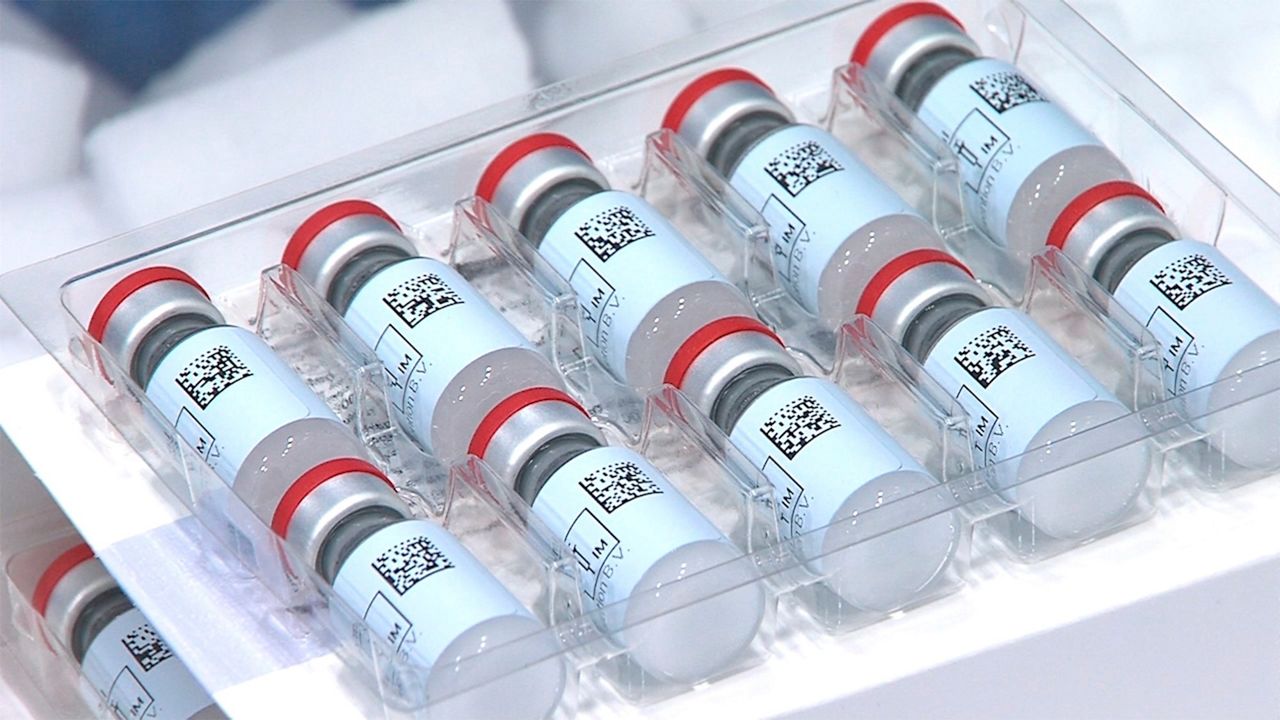A Centers for Disease Control and Prevention (CDC) advisory panel voted unanimously to recommend the one-dose Johnson & Johnson COVID-19 vaccine, allowing inoculations to begin after CDC director Dr. Rochelle Walensky accepted the panel's guidance.
The news comes one day after the Food and Drug Administration granted Johnson & Johnson’s coronavirus vaccine Emergency Use Authorization for adults 18 and over.
The single-shot inoculation is now the third coronavirus vaccine given authorization in the United States, as the country's vaccination effort continues to ramp up at a rapid rate.
Dr. Walensky said that the shot "has been shown to be safe and effective in preventing severe COVID-19 illness, hospitalization, and death" in a statement issued Sunday.
"The authorization of this vaccine expands the availability of vaccines, the best medical prevention method for COVID-19, to help us in the fight against this pandemic, which has claimed over half a million lives in the United States," Acting FDA Commissioner Janet Woodcock, M.D, said in a statement issued Saturday. "The FDA, through our open and transparent scientific review process, has now authorized three COVID-19 vaccines with the urgency called for during this pandemic, using the agency’s rigorous standards for safety, effectiveness and manufacturing quality needed to support emergency use authorization."
Only a few million doses will be shipped immediately after authorization, but production will ramp up in the coming weeks. By the end of March, Johnson & Johnson has said it can supply enough to vaccinate 20 million people – a much-needed boost to stretched supplies – and by June, the company expects to supply 100 million doses to the U.S.
In a statement, President Joe Biden called the authorization "exciting news for all Americans, and an encouraging development in our efforts to bring an end to the crisis."
"We know that the more people get vaccinated, the faster we will overcome the virus, get back to our friends and loved ones, and get our economy back on track," Biden said. "Thanks to the brilliance of our scientists, the resilience of our people, and the eagerness of Americans in every community to protect themselves and their loved ones by getting vaccinated, we are moving in the right direction."
Biden urged caution, warning that "this fight is far from over" and pleaded with Americans to "keep washing your hands, stay socially distanced, and keep wearing masks," noting that "things are still likely to get worse again as new variants spread, and the current improvement could reverse."
"There is light at the end of the tunnel, but we cannot let our guard down now or assume that victory is inevitable," he concluded. "We must continue to remain vigilant, act fast and aggressively, and look out for one another — that is how we are going to reach that light together."
Andy Slavitt, a White House senior adviser on the COVID-19 response, celebrated the news on Twitter shortly after the authorization was granted: "We are ready to roll it out!"
Rep. Andy Kim, a Democrat from New Jersey, also celebrated the news: "Let’s immediately mobilize everything we can as a nation to get them to seniors, veterans and those that need it most."
The Johnson & Johnson vaccine is different from the two shots already being administered for a few reasons. The J&J vaccine requires one jab compared to Pfizer & Moderna’s two-dose regimen, and is 66% effective overall at preventing moderate to severe cases of coronavirus, according to findings released last month. The single-shot regimen is much more protective — 85% — against the most serious symptoms of the virus.
"The more vaccines that have high efficacy that we can get into play, the better," Dr. Anthony Fauci, the nation's top infectious disease expert and President Joe Biden's chief medical adviser, said ahead of the authorization.
Two doses of the Pfizer and Moderna shots were found to be about 95% effective against symptomatic COVID-19, findings that led the FDA to pass down their respective EUAs.
And while those efficacy rates may seem startlingly different, it’s not an apples-to-apples comparison: A more recent study conducted in Israel found Pfizer’s vaccine was 92% effective at preventing severe disease after two shots and 62% after one.
J&J has another large study underway to see if a second dose of its vaccine works better, raising the prospect that countries could eventually add a booster if one turned out to be warranted.
The J&J vaccine is also easier to handle, lasting three months in the refrigerator compared to the Pfizer and Moderna options, which must be frozen.
J&J’s shot uses a cold virus like a Trojan horse to carry the “spike” protein of the SARS-CoV-2 virus into the body, where cells make harmless copies of the protein to prime the immune system in case the real virus comes along.
"After a thorough analysis of the data, the FDA’s scientists and physicians have determined that the vaccine meets the FDA’s expectations for safety and effectiveness appropriate for the authorization of a vaccine for emergency use," said Peter Marks, M.D., Ph.D., director of the FDA’s Center for Biologics Evaluation and Research. "With today’s authorization, we are adding another vaccine in our medical toolbox to fight this virus. At the same time, the American people can be assured of the FDA’s unwavering commitment to public health through our comprehensive and rigorous evaluation of the data submitted for vaccines to prevent COVID-19."
Like other COVID-19 vaccines, the main side effects of the J&J shot are pain at the injection site and flu-like fever, fatigue and headache. No study participant experienced the severe allergic reaction, called anaphylaxis, that is a rare risk of some other COVID-19 shots, although one experienced a less serious reaction.
The Associated Press contributed to this report.



